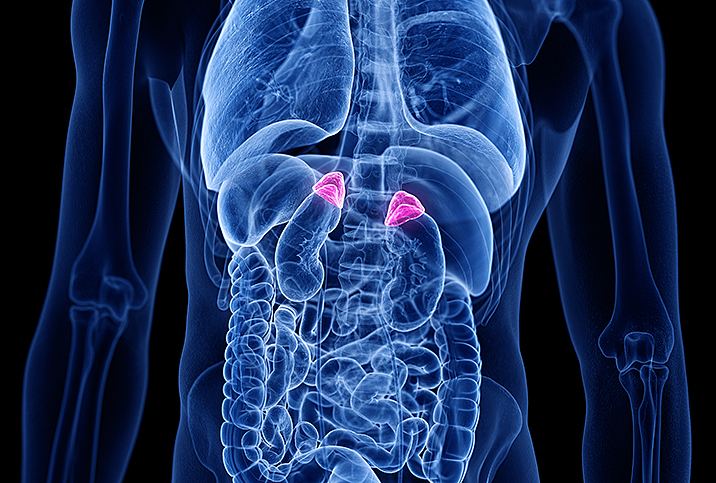Is Adrenal Fatigue Real?

Adrenal glands are real. The existence of "adrenal fatigue," on the other hand, is open to debate.
A 2016 systematic review of 58 studies concluded that what's popularly called adrenal fatigue—a variety of symptoms, including long-lasting fatigue, insomnia, joint pain and a lack of mental clarity—remains a "myth."
A statement from researchers published in 2018 in the South African Medical Journal noted adrenal fatigue purportedly occurs when exhausted adrenals—those endocrine system glands located atop each kidney and responsible for releasing hormones—are unable to produce cortisol. However, no adequate, objective, reproducible clinical evidence exists for its diagnosis or existence, according to the authors.
Yet you can watch a documentary film, read a book, find a supplements website or listen to a podcast all about "adrenal fatigue," a condition not recognized by the medical community.
"'Adrenal fatigue' is a term used to describe a state of chronic exposure to stressful situations, leading to 'overuse' of the adrenal gland, which then leads to its failure," said Roselyn Mateo-Collado, M.D., an endocrinologist at Rush University Medical Center in Chicago.
But, Mateo-Collado emphasized, "chronic stress does not cause physical destruction of the adrenal gland or the pituitary gland, so it should not impair their function."
Distinguishing adrenal insufficiency from adrenal fatigue
According to Mateo-Collado, the term "adrenal fatigue" is not interchangeable with clinically recognized conditions such as adrenal insufficiency, caused by the failure of either the adrenal glands to synthesize corticosteroids and mineralocorticoids, or the pituitary gland to produce hormones involved in stimulating the adrenals to perform.
Insufficiency can be diagnosed with a blood test; fatigue cannot. But Mateo-Collado suggested that theories conflating adrenal insufficiency with fatigue, while misguided, retain appeal at least partially because the diagnosable condition can be treated with steroids. Patients might read about adrenal fatigue, match their symptoms to the description, and assume a similar steroid-based treatment will address their problems.
"Unfortunately, this improper characterization of the physiology of the hypothalamic-pituitary-adrenal (HPA) axis immediately places this syndrome at odds with traditional endocrinologists," Rashmi Mullur, M.D., an endocrinologist at UCLA Health in Santa Monica, California, wrote in a commentary for Endocrine Practice journal, adding, "We clearly need to break this false narrative."
But Mullur, who was not available for comment for this story, acknowledged that telling patients adrenal fatigue is not a real condition can be insensitive and detrimental to the therapeutic relationship between patient and doctor.
Hormonal changes due to chronic stress
To be clear, chronic stress absolutely can affect hormones.
Alan Marcus, M.D., a doctor who practices at practice at South Orange County Endocrinology in Laguna Hills, California, explained that the hormone cortisol minimizes the effect of stress on individual cells so the cells can survive.
Mateo-Collado mentioned evidence for the negative effects of chronic stress on sexual function, although she said the mechanisms involved are not well defined in humans.
Imagine there are two axes that release hormones. One axis is composed of the hypothalamus, the pituitary and the adrenal glands. The other is composed of the hypothalamus, the pituitary and the gonads. In animals, it has been observed that hormones released from the former axis in response to stress can interfere with the latter axis' hormonal secretions. The extra cortisol released in response to stress interferes with the release of gonadotropin-releasing hormone (GnRH), luteinizing hormone (LH) and follicle-stimulating hormone (FSH) at the hypothalamic and pituitary levels.
'Stress and anxiety may also trigger the way the brain sends signals to the testes to allow for better blood flow.'
Why is this important?
"A reduction in gonadotropin release results in less production of gonadal steroids, such as testosterone and estradiol," Mateo-Collado said during an email exchange. "Stress and anxiety may also trigger the way the brain sends signals to the testes to allow for better blood flow. Low sex drive deserves a [workup] to rule out any underlying illnesses!"
Marcus said about 80 percent of men with low testosterone have secondary hypogonadism, which means the gonads or testes are functional but the hypothalamus or the pituitary, which should be stimulating them to produce testosterone, is not releasing the requisite stimulatory hormones. Most of these men have diabetes or prediabetes, which suggests glucose elevation and, often, the secondary elevation of cortisol, preventing insulin from binding to muscle tissue and affecting many parts of the body, he said.
"Obviously, if you're stressed in whatever ways—running a marathon or if you're ill or anything like that—you can have, theoretically, an overutilization of hormones that you're making, namely cortisol, in response to stress," Marcus said.
But he described attempts to diagnose adrenal fatigue as "faulty," and referenced diagnoses relying on tests of salivary cortisol, which endocrinologists typically use to test for elevated cortisol, a bodily situation in direct contrast with what's assumed in the context of adrenal fatigue. In fact, it's what doctors actually find in Cushing syndrome, which is characterized by an excess of cortisol. No one has published a study demonstrating a legitimate diagnosis or basis for understanding adrenal fatigue, he said.
"The adrenal gland is incredibly competent at producing cortisol," Marcus said.
He added, however, autoimmune diseases, such as Schmidt syndrome, can result in antibodies attacking the adrenal glands, causing cortisol deficiency, among other complications.
Ineffective treatments
Treatments—namely corticosteroids and mineralocorticoids—for diagnosable adrenal gland conditions, such as adrenal insufficiency, do not show a demonstrable long-term benefit for patients suffering from fatigue, Mateo-Collado explained.
"Testosterone similarly can make one feel good, and it is used to treat hypogonadism since the body can no longer make testosterone. But for the nonhypogonadal patient, over time, it will actually suppress the body's natural ability to make testosterone," Mateo-Collado said, likening this process to the testes becoming "lazy" thanks to exogenous testosterone, because they no longer have to shoulder the load of supplying the body with the needed hormone.
Similarly, a patient's adrenal glands can become "lazy" if doctors administer steroids when they are not needed and cannot help.
Mullur, a board-certified specialist in endocrinology and internal medicine, wrote in Endocrine Practice that in her experience, patients who ask about adrenal fatigue are not stubbornly tethered to the typically false notion their problems necessarily stem from adrenal gland dysfunction. She cited traumatic life experiences as a recurring theme among patients who come in with these concerns.
Some of these patients, in an attempt to avoid the stigma associated with mental health issues, including stress, latch on to the idea that their adrenal glands are malfunctioning. Instead, patients and doctors should look toward stress reduction methods.
Mullur pointed to evidence that mind-body techniques, such as meditation, yoga and tai chi, can improve quality of life and brain structure previously exposed to trauma. She also referred to small studies supporting the use of integrative approaches, such as acupuncture, to enhance energy levels in chronically stressed and fatigued patients.


















